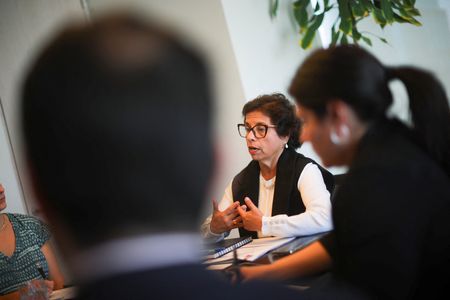By Daina Beth Solomon, Fabian Cambero and Ernest Scheyder
SANTIAGO (Reuters) – Chile’s state-run copper miner Codelco must focus on boosting its production, but it has a global prestige that would not be tarnished if it cedes its role as Chile’s top producer to rival BHP, Mining Minister Aurora Williams said on Thursday.
Codelco, the world’s largest copper producer and a symbol of national pride, is aiming this year to reverse two years of falling production in a bid to not only boost profits but also buttress Chile’s sway over global markets.
That plan has been complicated as cost overruns and delays, including accidents, have dogged maintenance and expansion projects.
While Codelco met its first-quarter production target, April’s numbers likely will be “a little low,” Williams said, after a worker died in an accident at the company’s Radomiro Tomic mine, shuttering production for a few days.
Codelco produced 1.42 million metric tons of copper in 2023, while the mines in Chile operated by Australian miner BHP, including Escondida, the world’s biggest copper mine that it co-owns with Rio Tinto and Japan’s JECO Corp, produced 1.39 million tons.
The 50-year-old Codelco accounts for about a quarter of total copper output in Chile.
“I don’t think that just one element – production – could at some point detract from Codelco’s prestige,” Williams told Reuters in an interview, when asked about the potential fallout of Codelco being displaced by BHP. “Outside Chile, to talk about Codelco is to talk about a benchmark in mining.”
President Gabriel Boric on Wednesday told nearly 2,000 attendees at a major copper industry conference that he expected Codelco’s output to rebound this year.
Williams said she was also supportive of BHP boosting production, noting that Escondida alone produces more than 1 million tons of copper a year.
“This is more than a competition. It’s about producing responsibly and developing the mining sector,” she said.
Along with that goal, Chile aims to support new projects through faster permitting processes, and wants to boost production of the battery metal lithium, which is currently only extracted by two companies in the country.
Saudi Arabia’s embassy in Santiago approached the ministry about hosting a delegation from the Middle Eastern country later this year to discuss potential investments in Chile’s mining sector, said Rodrigo Urquiza, the ministry’s head of international affairs.
Williams declined to be more specific about which metals could be of interest to Saudi Arabia.
NEW TECHNOLOGIES
On lithium, Williams said that the Boric administration had no plans to mandate a specific type of direct lithium extraction (DLE) technology for private companies that aims to extract the battery metal from the country’s salt flats.
Boric last year announced an ambitious plan to phase out evaporation ponds, traditionally used to remove the metal from brine, and require the use of DLE across the country, which has the world’s largest lithium reserves.
“For us, it’s implicit that lithium development has to come with new technologies,” Williams said.
She unveiled a process earlier this week to solicit private interest in development of the country’s salt flats. As part of the application process, the ministry is asking applicants what type of DLE they would use.
“There is no single recipe here, because the salt flats are different,” she said.
(Reporting by Daina Beth Solomon, Ernest Scheyder and Fabian Cambero; Editing by Jamie Freed)



